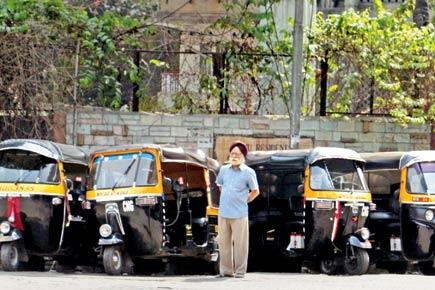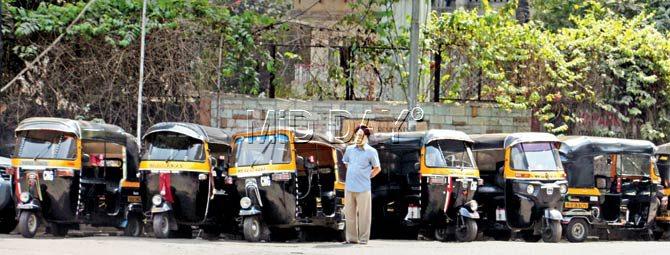Not satisfied with holding city to ransom yesterday, auto unions have plans to cause more grief for Mumbaikars. Sources claim that yesterday's strike was just to check their strength

With auto rickshaws going on strike in less than eight months yesterday and the leadership of the transport department changing every few months, the commuters had to face inconvenience and shell out big bucks to reach their destination.
ADVERTISEMENT
Also Read: Mumbaikars reach simmering point as rickshaws hold the city to ransom

Autorickshaw drivers on strike at Juhu Tara Road yesterday. Pic/Swarali Purohit
Over a lakh autorickshaws went off the roads in the suburbs last June and again yesterday to protest the operations of private taxi aggregators and rise in permit fees, troubling lakhs of Mumbaikars who were stranded in both Eastern as well as Western suburbs.
Musical chairs
The frequent change in leadership cost the commuters heavily yesterday as the communication between the union and the authorities is disrupted often.
Read Story: Commuters hit hard as autorickshaws go off roads in Mumbai
Shyam Wardhane took over as Transport Commissioner last month from Sonia Sethi, who took a transfer without continuing her tenure. Even Wardhane is slated to retire in six months. Also, Additional Chief Secretary (Transport), Gautam Chatterjee retired on January 31.
Wardhane met with the auto union to resolve the matter but the 2.5-hour-long meeting didn’t prove to be of much help. RTO sources said the demands of the union were only discussed while no decision was taken.
“We had an amicable and fulfilling meeting with the union leaders who agreed to withdraw their strike. The demands raised by them are policy matters and are being looked into,” said Wardhane.
Again next week?
Sources in the union claimed that yesterday’s strike was just to check their strength. “At least 90 per cent of autos remained off roads. We will continue our protest in different forms next week and the line of action for that will be decided in the next three days,” said Shashank Rao, President, Mumbai Autorickshaw and Taximen Union.
High charges
There were pockets across Mumbai namely Bandra (E) and (W), Jogeshwari (E), Mulund, Vikhroli (E), Kurla to name a few where around 25,000 illegal rickshaws plied and fleeced stranded commuters. They charged at least 1.5 times the usual amount and seated 4-5 people in a rickshaw. Even tourist taxis took advantage of the situation.
The taxis not being part of the strike brought some respite to commuters as they operated in the suburbs too.
Mobile application-based services like Uber and Ola did manage to run the show with surge in prices of up to five times.
Ironically, the strike was against these services but it ended up benefiting them. “We want Uber and Ola to be off roads until the new policy for them hasn’t been approved by the government. Also tourist taxis should not ply,” said Rao.
Uber said the prices went up due to high demand. “We are committed to keep Mumbai moving when other options are not available for people. We did see dynamic pricing kick in at peak times, because of exceptionally high demand, and our teams and driver-partners worked tirelessly to try and balance the marketplace,” said Shailesh Sawlani, general manager, Uber West.
 Subscribe today by clicking the link and stay updated with the latest news!" Click here!
Subscribe today by clicking the link and stay updated with the latest news!" Click here!







